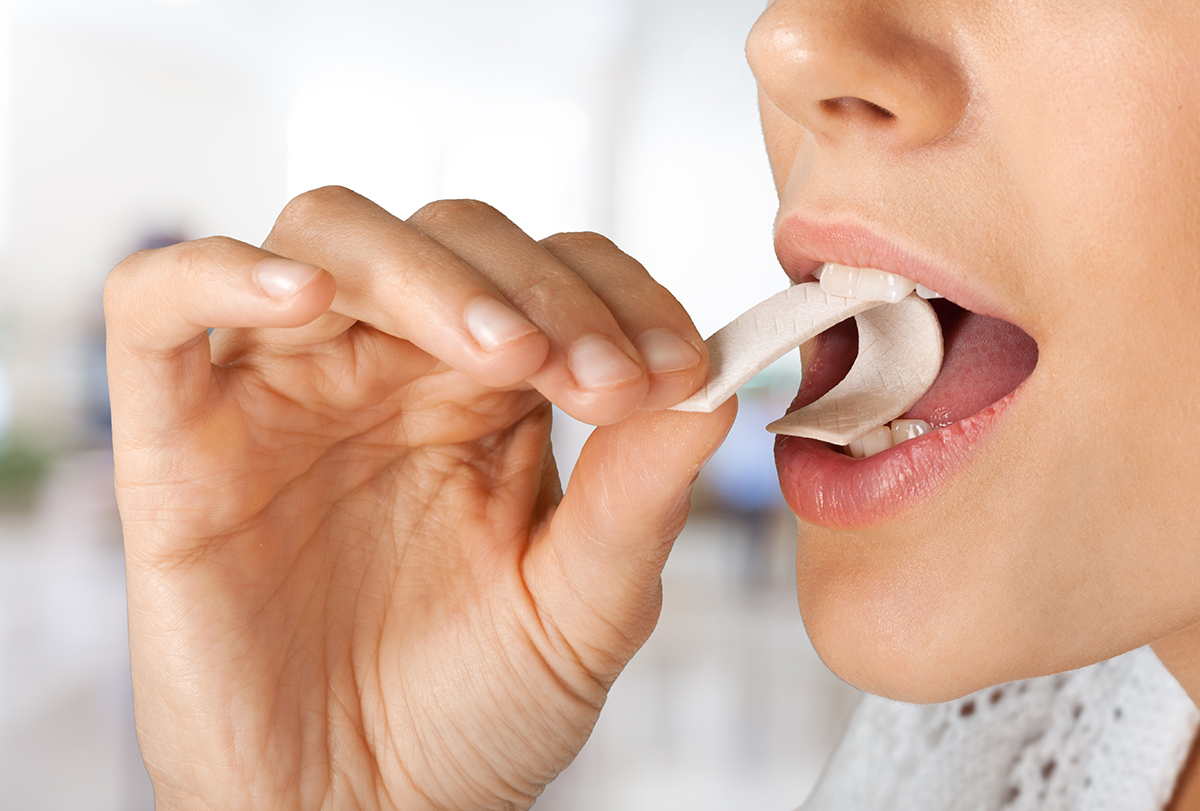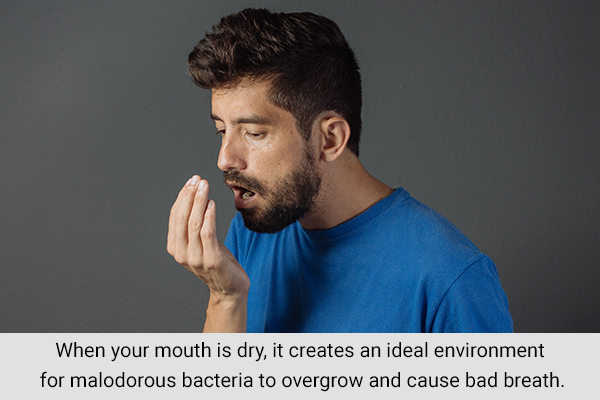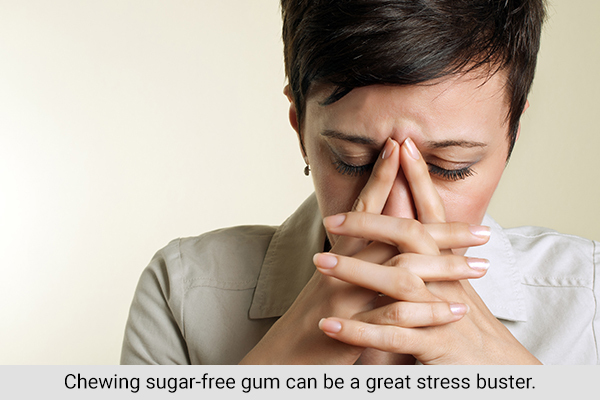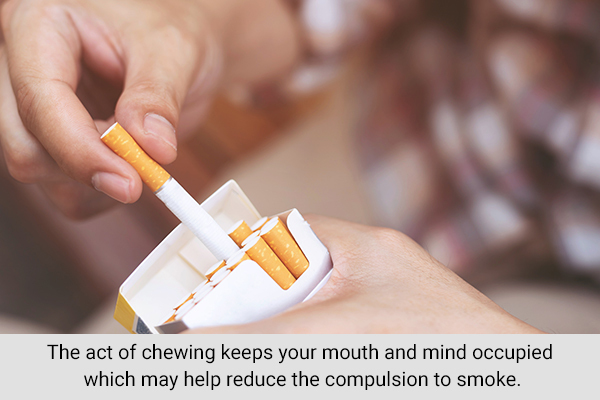In this article:
Sugar-free gum is quite useful when it comes to addressing some common ailments. All you have to do is to chew on it, and this simple act can have a positive effect on your oral, digestive, and mental health without the risk of side effects.

Benefits of Chewing Sugar-Free Gum
Chewing unsweetened gum can help improve your health in the following ways.
1. Supports oral health
A healthy oral cavity is naturally populated with various bacterial strains that live in harmony with each other.
When you chew food, these bacteria help break down the sugars and carbs in the mouth so that they become easier to digest later. But in doing so, they release certain acids as by-products that corrode the enamel or outermost layer of the teeth.
Negligent oral hygiene causes food residue to accumulate inside the mouth, which invites more bacteria that feed on the sugars. The food debris, saliva, and bacteria mix together to form a sticky yellowish layer over the teeth and gums called plaque.
Plaque bacteria continue to dissolve the teeth slowly, and the damage can reach deeper levels, giving rise to caries and cavities. Plus, plaque bacteria can damage and infect the gums.
The most basic and important step to avoid such oral hygiene issues is to brush your teeth twice a day, floss regularly, and preferably use mouthwash.
Experts recommend brushing or rinsing your mouth after each meal, which is when oral bacteria spring into action and release the most acid that increases the risk of tooth decay and gum disease.
But this can be a challenge when you are not at home. In such situations, chewing a piece of sugar-free gum for 20 minutes after eating or drinking can serve as a good alternative to reduce plaque buildup inside the mouth.
The chewing action stimulates the salivary glands to produce more saliva, which washes over the teeth and gums to clear some of the sugar or food particles stuck in the crevices. This can help deter further plaque buildup, but it is unlikely to reduce your current plaque scores, which require proper dental cleanup. (1)
A 2019 study showed that xylitol and sorbitol, the two main dietary polyols found in sugar-free gum, (2) helped bring down the plaque, gingival, and bleeding scores in the subjects. (3)
Moreover, saliva has a high pH, which helps neutralize the plaque pH after a sugar breakdown to inhibit more bacterial growth and tooth decay. (4) The increased flow of saliva may even lead to faster remineralization of teeth.
2. Fights bad breath

A dry mouth creates an ideal environment for malodorous bacteria to overgrow and cause bad breath. Chewing sugarless gum triggers increased salivary flow to hydrate the mouth and thereby prevent or reduce bad breath. (5)
3. Reduces acidity
Acid reflux is the backflow of stomach acids into the esophagus, which causes a burning sensation in the chest known as heartburn and leaves a bitter acidic taste in the mouth. This is a very common problem that may occur occasionally after indigestion or it can be more chronic.
Everyone suffers from acidity time and again, with antacids generally being the go-to solution.
But something as simple as chewing sugar-free gum can also help provide quick relief. It works by stimulating the flow of saliva inside the mouth, which needs to be gulped down frequently.
Saliva naturally has a high pH, making it basic in nature. Thus, the increased ingestion of saliva helps neutralize the stomach acid to make it less corrosive and irritating to the sensitive inner lining of the gastrointestinal tract. It’s best to chew gums that contain bicarbonate, which can further counteract stomach acids. (5)
Not just that, but chewing gum may help improve the peristaltic movement of the digestive tract to prevent the regurgitation of stomach acids into the food pipe.
4. Provides stress relief

Chewing sugar-free gum can be a great stress buster. It helps redirect your mind from negative thoughts to the constant act of chewing. In a way, it helps you vent out your pent-up tension and anxieties for a relaxing effect.
A 2016 study concluded that this intervention may even help reduce feelings of depression, a stress-related disorder. (6) However, there is still very limited research on the relationship between gum chewing and mental health.
One study that examined the effect of chewing unsweetened gum for 2 weeks days on the mood and fatigue levels of healthy young adults produced inconclusive results. (7)
So, more extensive human trials are needed to properly assess just how useful it is for mental well-being.
5. Improves concentration, attention span, and memory
It is well known that chewing gum is used for sleepiness prevention during work, learning, and driving.
According to a 2015 study, chewing sugarless gum can help make you more alert and attentive, thus improving your overall cognitive performance. (8)
Plus, it may enhance your ability to memorize things. (9) This may be due to the fact that chewing helps increase the blood flow to areas of the brain responsible for building concentration and memory.
Thus, it is no surprise that people often chew gum to keep themselves awake and alert during monotonous situations such as a boring day at work, learning in an uninteresting class, or driving long distances.
6. Helps with smoking cessation

Anyone who has tried quitting smoking will attest that it is one of the most difficult things to do. A majority of those who managed to give it up only did it after repeated attempts.
Cigarettes contain a chemical called nicotine, which makes them so utterly addictive and damaging at the same time.
If you are struggling to overcome this deadly habit, nicotine sugarless gum can help make things a little easier. Your body is used to concentrated amounts of nicotine present in cigarettes, but nicotine gum only administers small doses in your system to quell your urges and gradually wean your body off it. (10)
Also, the act of chewing keeps your mouth and mind occupied, which may help reduce the compulsion to smoke. (11)
The correct way to use nicotine gum is to slowly bite it down on the gum until you get a tingling sensation in the mouth. Regular smokers may start with 9–24 pieces of gum daily for the initial 6 weeks and gradually taper down their use thereafter.
It is best to consult your doctor for proper use.
Note: Nicotine gum is not recommended for people with dental caps, dentures, or partial bridges as it can stick to them and cause damage. In such cases, you are advised to consult your doctor or pharmacist about medications that can help you quit smoking. (12)
7. Relieves nausea
If you are feeling nauseous due to an upset stomach, morning sickness, or motion sickness, chewing on a sugarless mint or ginger gum may help. Both mint and ginger are natural antiemetic agents that help soothe nausea.
Moreover, nausea is often triggered by too much stomach acid, which can be neutralized through this intervention. The act of chewing increases saliva in the mouth, which travels down into the stomach to offset the acidity. (13)
Can You Chew Sugar-Free Gum Before a Glucose Test?
Yes, chewing unsweetened gum is unlikely to have any effect on your blood glucose levels. (14)
Final Word
Sugar-free gum is known to deliver a number of health benefits, but more extensive research is needed to determine just how effective it is. Nevertheless, this cheap and easily available product is unlikely to cause adverse side effects, making it worth a try.
- Was this article helpful?
- YES, THANKS!NOT REALLY


